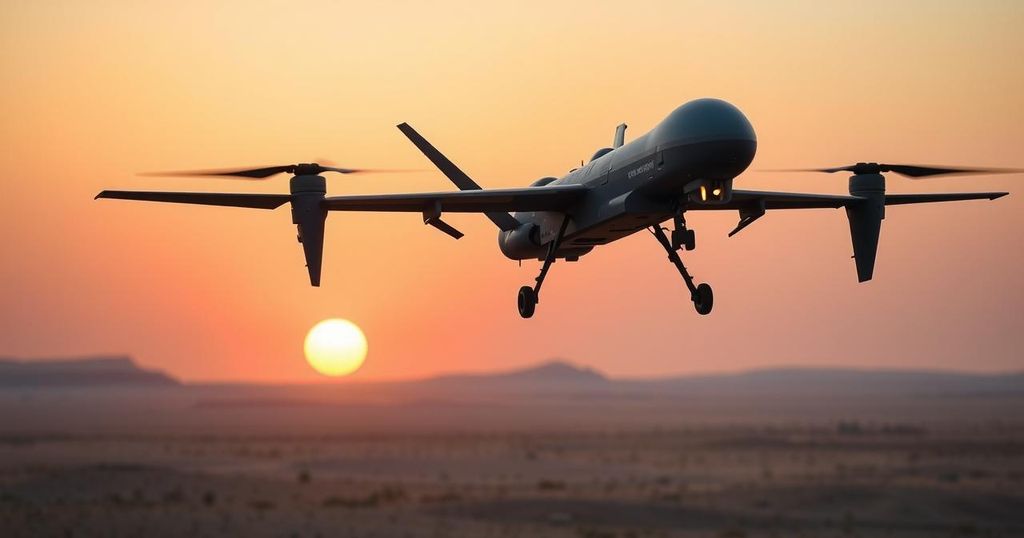A Kurdish military official has denied claims that Kurdish forces obtained drones from Iran, labeling them as Turkish propaganda. He asserted that their drone capabilities are developed internally. The official discussed the ongoing Kurdish control in Syria and the historical enmity with Turkey, emphasizing the challenges posed by misinformation and the need for regional stability, including potential partnerships with Israel.
A Kurdish military official has firmly denied accusations that Kurdish forces acquired drone technology from Iran, characterizing such claims as Turkish propaganda. In an interview with The Jerusalem Post, the official emphasized that their drone capabilities are rudimentary and developed internally by Kurdish fighters. He criticized Turkish media, particularly Yeni Safak, for allegedly distorting the image of Kurdish forces and falsely linking them to extremist regimes, particularly in the context of ongoing military actions against them by Turkey.
The official discussed the situation in Kurdish-controlled areas of Syria, asserting that Kurdish forces maintain control over 30-35% of the region. He noted that this area is currently one of the safest in Syria, expressing that Kurdish autonomy stands as an obstacle to Turkish President Erdogan’s expansionist ambitions. Despite enduring attacks from Turkish forces, the official remarked that Turkey has been unsuccessful in advancing east of the Euphrates River and has resorted to spreading misinformation through media channels.
The Syrian Democratic Forces (SDF) also publicly denounced the accusations made by Turkish media. They emphasized that their drone capabilities are the result of local initiatives and criticized the Turkish government’s media as being complicit in a campaign against the Kurdish population. The SDF’s statement echoed the sentiments of the Kurdish military official, accusing Turkish media of fabricating falsehoods that aim to undermine Kurdish forces and create hostility towards them.
A longstanding enmity exists between Turkey and its Kurdish minority, a dynamic rooted in ethnic tensions and the drive for Kurdish autonomy. The Kurdish population, which represents about 15-20% of Turkey’s demographic, has faced ongoing military actions from Turkish forces, who label them as terrorists due to associations with the PKK organization. Consequently, Turkey has occupied various Kurdish regions in northern Syria, further exacerbating these tensions.
The Kurdish military official expressed apprehension regarding the implications of the new administration in Damascus on Kurdish affairs. He indicated that both Turkey and Iran operate under extremist religious regimes which harbor animosity towards the Kurds. The Kurdish presence is not only significant in Turkey but also impacts the broader Middle Eastern geopolitical landscape as the Kurds strive for autonomy while facing aggressive Turkish incursions.
Lastly, the official addressed the complicated relationship with Israel, acknowledging the potential of Jewish contributions to regional peace. While wishing for a cooperative relationship, he noted that current political climates pose challenges to open dialogues. He expressed optimism regarding Israel’s capacity to contribute positively towards achieving stability and peace in the Middle East.
The article discusses the ongoing tensions between Kurdish forces and Turkey, particularly in the context of unsubstantiated claims concerning Iranian drone technology. The Kurdish military official refutes these claims as propaganda from the Turkish government, emphasizing the independent development of their military capabilities. The situation in Syria, marked by Kurdish autonomy and conflict with Turkish interests, is historically significant given the ethnic makeup of the region and the complex political dynamics at play.
In summary, Kurdish forces categorically reject Turkish assertions regarding foreign drone assistance and underscore their autonomous military development. The Kurdish administration’s control over parts of Syria remains a contentious issue amid Turkish aggression. The plight of the Kurdish minority and their pursuit of autonomy continues to be hindered by geopolitical pressures and media misinformation, posing significant challenges to peace in the region.
Original Source: www.jpost.com







